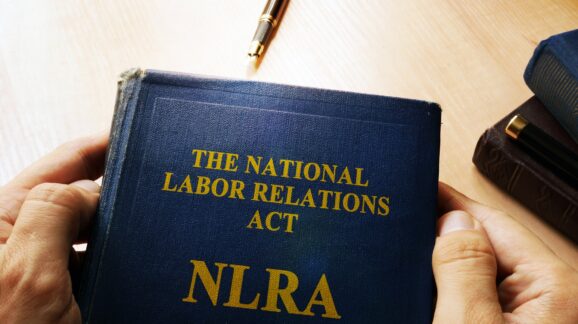NLRB seeks to revoke First Amendment for management.

Photo Credit: Getty
The National Labor Relations Board (NLRB) last week sent a warning that literally anything management says about a union organizing bid can be construed as a threat to employees and is therefore a violation of the law. An NLRB administrative law judge (ALJ) has ruled that Amazon chief executive officer Andy Jassy threatened workers if they unionized, despite the fact that the board cannot point to any actual threats made by Jassy.
In effect, the NLRB is attempting to create a new legal standard that denies management any First Amendment rights when it comes to talking about unions. In doing so the NLRB is tossing out its own precedents and contradicting the National Labor Relations Act (NLRA), the law it is charged with enforcing.
It is illegal under NLRA for managers to retaliate, threaten, or bribe workers engaged in an organizing bid. Any other statements, however, are allowed. The law states, “[T]he expressing of any views, argument, or opinion [by management] … shall not constitute or be evidence of an unfair labor practice … if such expression contains no threat of reprisal or force or promise of benefit.”
Unions have been attempting to organize Amazon’s warehouses for years now and the company has resisted those efforts. A NLRB administrative law judge alleged in a May 1 unfair practices complaint that Jassy crossed the line with comments made during interviews with CNBC and Bloomberg in 2022.
Here’s one such comment by Jassy to CNBC. The length is necessary to put the NLRB’s complaint in proper context:
“You know, first of all, of course, it’s … employees’ choice whether or not they want to join a union. We happen to think they’re better off not doing so for a couple of reasons at least. You know, first, at a place like Amazon that empowers employees, if they see something they can do better for customers or for themselves, they can go meet in a room, decide how [to] change it and change it. That type of empowerment doesn’t happen when you have unions. It’s much more bureaucratic, it’s much slower. I also think people are better off having direct connections with their managers. You know, you think about work differently. You have relationships that are different. We get to hear from a lot of people as opposed to it all being filtered through one voice.”
Note that Jassy makes no threat to workers at Amazon and even makes a point of saying that forming a union is their own choice. He merely argues that there’s a possible downside to that. The other comments are similar in substance and tone. They all ought to be protected speech under a commonsense reading of the NLRA.
The ALJ said otherwise, finding that “Jassy’s comments that employees would be better off without a union were accompanied by his coercive predictions about the effects of unionization.” This is patent nonsense. There is nothing “coercive” about rendering an opinion about the potential consequence of the action if the person rendering the opinion is neither starting nor implying that they might do anything. The ALJ is literally manufacturing its own evidence by reinterpreting anything a manager says that is short of supporting unionization as evidence of interference with the workers’ rights.
The ALJ admits that the NLRB has “consistently deemed lawful” predictions such as Jassy’s under its existing precedent, a 1985 case called Tri-Cast. The board’s current general counsel, Jennifer Abruzzo, has recently urged the board to overturn that precedent.
Such a change would force managers to be completely silent during organizing bids, ensuring that workers hear only one side of the story regarding how unionization might affect them. Unions certainly aren’t going to take the time to explain the potential downsides.
The case will go before NLRB, which currently has three Democratic appointees and one Republican one. It’s expected to endorse the ALJ’s conclusion. Amazon has the option of appealing that decision in civil court. It has not publicly commented on the decision.